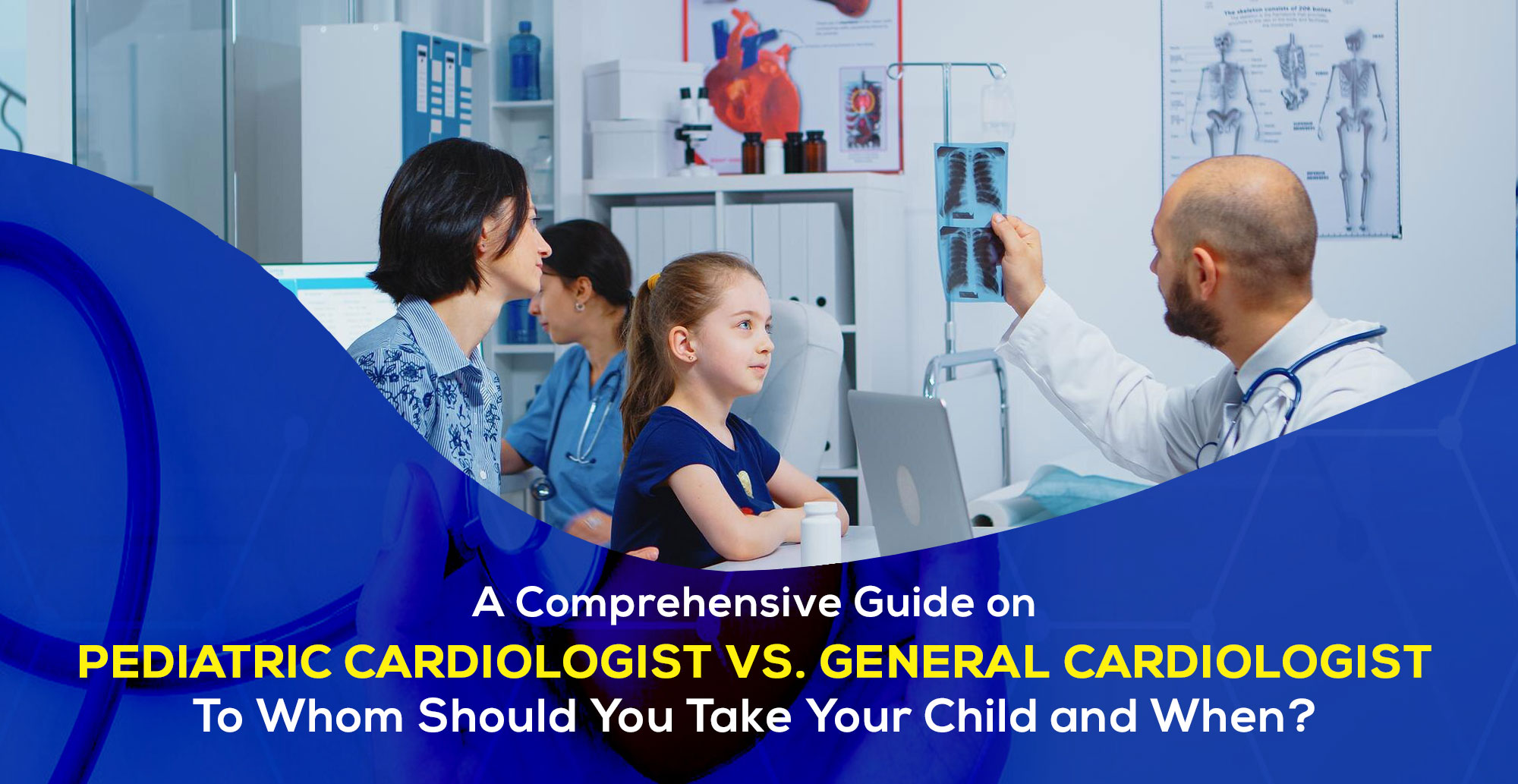Subtotal $0.00
- Introduction
Pediatric Cardiologist vs. General Cardiologist:
ToggleUnderstanding Cardiology
Cardiology is the branch of medicine dealing with the heart and blood vessels. Cardiologists are specialists who diagnose, treat, and manage heart conditions. But not all cardiologists are the same; some focus specifically on children, while others treat adults.Who is a pediatric cardiologist?
A pediatric cardiologist specializes in diagnosing and treating heart conditions in children, from newborns to teenagers. These doctors undergo extensive training in pediatric medicine and pediatric cardiology. They treat congenital heart defects, arrhythmias, and heart failure.Who is a general cardiologist?
On the other hand, a general cardiologist treats adult heart conditions.They manage heart diseases like coronary artery disease, heart failure, and hypertension. While they are experts in adult heart health, their training does not typically cover the specific needs and conditions of pediatric patients.Key Differences between Pediatric and General Cardiologists
- Age of Patients: Pediatric cardiologists treat childrenupto the age of eighteen years, while general cardiologists treat adults.
- Types of Conditions: Pediatric specialists focus on congenital and early-life heart issues. General cardiologists handle adult-onset heart diseases.
- Approach to Treatment: Pediatric cardiologists often use techniques and equipment tailored for children.
When to See a Pediatric Cardiologist?
- Congenital Heart Disease:If your child is born with a heart disease, such as a hole in the heart (septal defect) or valve abnormalities, a pediatric cardiologist is essential. They have the expertise to manage these conditions from infancy through adolescence.
- Chest Pain and Fainting:Children who are experiencing unexplained chest pain or fainting should see a pediatric cardiologist for an examination to rule out any underlying cardiac conditions.
- Genetic Heart Conditions:If there is a family history of heart disease, especially genetic conditions, a pediatric cardiologist can provide screening and monitoring for your child.
- Follow-up Care for Previously Diagnosed Heart Conditions: Children who have undergone heart surgery or other treatments for heart conditions require ongoing care from a pediatric cardiologist to monitor their progress and manage any long-term effects.
When to See a General Cardiologist?
Seeing a general cardiologist is appropriate in several situations, typically involving adult patients or when dealing with heart conditions that are not age-specific. Here are some scenarios when you might see a general cardiologist:- Adult Heart Conditions: If you are an adult with a heart condition, a general cardiologist is the right specialist. They are trained to handle a wide range of adult cardiovascular issues, including coronary artery disease, heart failure, arrhythmias, hypertension, and more.
- Routine Heart Health Management: For ongoing management of heart health, such as monitoring high blood pressure, cholesterol levels, or managing chronic heart disease, a general cardiologist provides comprehensive care.
- Initial Cardiac Evaluation: If you have symptoms such as chest pain, shortness of breath, palpitations, or dizziness, a general cardiologist can perform an initial evaluation, including diagnostic tests like EKGs, echocardiograms, stress tests, and more.
- Preventive Cardiology: If you have risk factors for heart disease, such as a family history, diabetes, smoking, or obesity, a general cardiologist can help with preventive strategies to reduce your risk of developing heart disease.
- Post-Cardiac Event Care: After a heart attack, cardiac surgery, or other significant cardiac events, follow-up care with a general cardiologist is essential for recovery and prevention of future issues.
- Coordination of Care: For patients with complex health conditions that affect the heart, a general cardiologist can coordinate care with other specialists, ensuring a comprehensive approach to treatment.
Treatment Approaches
Treatments vary but generally include:- Medications: To manage symptoms or conditions like arrhythmias.
- Surgical Interventions: For structural issues or severe defects.
- Lifestyle Changes: Diet and exercise recommendations to improve heart health.
- Fetal/Prenatal Eco-Cardiography: To ensure early detection of congenital heart defects (CHDs) before birth, parents need to consult pediatric cardiologists for fetal echocardiography. It is a detailed prenatal ultrasound examination of the fetal heart. It is typically performed between 18 to 24 weeks of pregnancy, although it can be done as early as 16 weeks in certain cases. The procedure involves using sound waves to create images of the baby’s heart, enabling healthcare providers to assess its structure and function.
- Non-invasive Cardiology: When a child is diagnosed with a heart condition and requires non-invasive cardiology, which focuses on diagnosing and treating heart conditions without the need for surgical intervention, you need to visit a pediatric cardiologist. The procedure consists of a variety of advanced imaging technologies and diagnostic tests to assess the structure and function of the heart, instead of cutting into the body. Common non-invasive tests like echocardiography, ECG, or cardiac MRI are used for a detailed assessment of the heart’s chambers, valves, and surrounding structures. It allows cardiologists to visualize abnormalities or irregularities in real-time, guiding diagnosis and treatment decisions.
- Interventional Cardiology: For children who require catheter-based treatments, a pediatric interventional cardiologist can provide the interventional treatment, which is a non-surgical option that uses balloons, stents and devices to treat holes, blocked valves or arteries. These procedures are often preferable to open-heart surgery due to their lower risk and quicker recovery times.
Preventive Measures for Children’s Heart Health
To keep your child’s heart healthy:- Healthy Diet: Emphasize consumption of fruits, vegetables, and whole grains.
- Regular Exercise: Encourage physical activity.
- Avoid Smoking: Ensure children live in a smoke-free environment. Exposure to secondhand smoke can significantly increase the risk of developing cardio-pulmonary complications.
Pediatric Cardiologist vs General Cardiologist
If your child has a heart problem, it is generally recommended to see a pediatric cardiologist rather than a general cardiologist. Here are the reasons why: Specialized Training: Pediatric cardiologists have specialized training in diagnosing and treating heart conditions in infants, children, and teenagers. Training of Pediatric cardiologists specifically involves dealing with newborn and children with various heart conditions as opposed to general cardiology training where children’s heart disease forms only a small part of the curriculum while the whole focus remains on adult heart diseases. Age-Specific Expertise: Children’s heart conditions can be very different from those seen in adults. Pediatric cardiologists are experienced in dealing with congenital heart defects (present at birth), pediatric arrhythmias, and other heart issues that are unique to younger patients. Child-Friendly Environment: Pediatric cardiologists and their clinics are often better equipped to create a comforting environment for children. This can include child-friendly waiting rooms, smaller medical instruments designed for children, and staff trained to work with young patients. Growth and Development Considerations: Pediatric cardiologists are knowledgeable about how heart conditions can affect a child’s growth and development. They can provide guidance on how to manage these issues as your child grows. Multidisciplinary Approach: Pediatric cardiology often involves a team approach that includes pediatric cardiac surgeons, pediatric anesthesiologists, and other specialists who are all experienced in treating children.Collaborative Care
In some cases, collaborative care between pediatric and general cardiologists is necessary. For instance, children with complex congenital heart disease may need lifelong monitoring and treatment adjustments as they transition into adulthood. Both specialists may work together to ensure a seamless transition and comprehensive care plan.Making the Right Choice
When deciding whether to see a pediatric cardiologist or a general cardiologist for your child, consider the following steps:- Consult Your Pediatrician:
- Research and Referrals:
- Look for specialists with good reviews and ask for recommendations from other healthcare providers.
- Consider the Specific Condition:
- For most pediatric heart issues, a pediatric cardiologist is the best choice. However, for older teenagers or those transitioning to adulthood, a general cardiologist might be more appropriate.
- Evaluate Experience and Comfort:
- Ensure that the cardiologist has experience with your child’s specific condition and that your child feels comfortable with the doctor.
Case Studies
Real-life examples can be illuminating. For instance:- Congenital Heart Defect: A child born with a septal defect is successfully treated by a pediatric cardiologist.
- Inherited Condition: A teenager with a family history of heart disease is managed by a general cardiologist to prevent future issues.
- Parental Support and Resources: Connect with other parents facing similar challenges, learn more from books or websites, and join online forums to share experiences and advice.
Conclusion
Choosing between a pediatric cardiologist and a general cardiologist depends largely on the age of your child and the nature of their heart condition. Pediatric cardiologists are specially trained to handle the unique needs of children’s hearts, making them the best choice for younger patients with heart issues. As children grow and transition into adulthood, the expertise of a general cardiologist becomes more relevant. Always consult with your child’s primary care provider to make the best decision for your child’s heart health.FAQ on "Pediatric Cardiologist vs. General Cardiologist":
What is the difference between a pediatric cardiologist and a general cardiologist?
A pediatric cardiologist specializes in diagnosing and treating heart problems in children, while a general cardiologist typically deals with heart conditions in adults. Pediatric cardiologists are trained to handle the unique challenges and conditions that can affect a child's heart, whereas general cardiologists focus on adult heart diseases.
When should you take your child to see a pediatric cardiologist?
You should take your child to see a pediatric cardiologist if your child has symptoms of a heart condition, such as chest pain, shortness of breath, or fainting. Additionally, if your child has a known heart defect or a family history of heart disease, regular check-ups with a pediatric cardiologist are recommended.
Can a general cardiologist treat heart problems in children?
While a general cardiologist can treat some heart problems in children, it is usually best to consult with a pediatric cardiologist for specialized care. Pediatric cardiologists have the training and expertise to address the specific needs of children's heart health.
What are the common heart conditions treated by pediatric cardiologists?
Pediatric cardiologists treat a variety of heart conditions, including congenital heart defects, arrhythmias, heart murmurs, and cardiomyopathy. They also manage heart problems that arise due to other medical conditions, such as Kawasaki disease or rheumatic fever.
How can you find a qualified pediatric cardiologist in Kolkata?
To find a qualified pediatric cardiologist in Kolkata, you can ask for recommendations from your child's pediatrician, check with local hospitals and medical institutions, or search online for specialists with good reviews and credentials. It's important to choose a pediatric cardiologist with experience and a good reputation in treating children's heart conditions.

Dr. Debasree Gangopadhyay is a highly respected pediatric cardiologist based in Kolkata, India, specializing in the diagnosis and treatment of heart conditions in children. With a compassionate approach and a commitment to excellence, Dr. Gangopadhyay has made significant contributions to the field of pediatric cardiology. Her expertise includes managing congenital heart defects, arrhythmias, and other cardiovascular conditions in young patients. Dr. Gangopadhyay is dedicated to providing personalized care and staying updated with the latest advancements in pediatric cardiology. She is passionate about educating families on heart health and actively participates in research and community outreach programs.




Comments are closed